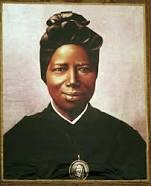Humble Faith in Jesus – St. Josphine Bakhita
(1 Kg 11:4-13; Ps 106; Mk 7:24-30)
*************************************************
In today’s first reading, the famous King Solomon lost his mind in old age and fell into idolatry in an attempt to please his wives, even though God had appeared to him to chastise and try to correct him.
On the other hand, the foreigner in the gospels, a Syrophoenician woman who had been raised in a world of idolatry, was able to recognize that Jesus had divine power to heal. She was able to set aside her attachment to the gods of her culture, lower herself to a humble state, and put her faith in Jesus. Amazingly, she got it right when most of Israel did not get it at all.
We may take a bit of offense at the seemingly harsh comment of Jesus about taking the children’s food and throwing it to the dogs. The Cree language can help us here. The word for dog is atim. The word for puppy is a more affectionate, softer version, acimisis. I suspect that was the word that Jesus was using in this case. And the woman, undeterred, was able to pick up on that endearing gesture to convince Jesus to heal her daughter.
In another gospel account, she addresses Jesus as both Lord and Son of David, implying that yes, she understood he was first to go to the Jews as Son of David, but she believed that he was also Lord of all people, so why not move things up and heal her gentile daughter now! I think it was that wise faith that touched Jesus’ heart and moved him to act on her behalf. As Jesus put it in other gospel incidents – “I have not seen such faith in all of Israel” and “The children of this world are wiser than the children of Israel.”
We have perhaps been too much like Solomon and need to be more like the Syrophoenician woman, letting go of our own false idols, putting our faith in Jesus and helping each other to journey toward healing. The idols we face are the same ones Jesus faced in the desert – an inordinate focus on possessions and pleasure, a selfish need for prestige and fame, and the abuse of power and control.
This encounter is an example of inter-religious dialogue in which Jesus allows himself to be influenced by the prayers of a gentile, which would be shocking to the Jews, and perhaps is still shocking to some cradle Catholics to this day. Her persistence is also an example of the power of persevering in prayer, very much like Monica who prayed for her son Augustine for over twenty years, and the Martins who prayed that their children would become saints. Several of their children joined religious life, and their youngest is one of our most beloved saints: Thérèse of Lisieux.
The Church honors today Josephine Bakhita, who exemplifies humble faith and perseverance in prayer. According to the Living With Christ, she was born in 1869 in the Darfur region of western Sudan. Slave traders kidnapped her when she was only nine and gave her the name Bakhita, which means “fortunate.” While it may seem a cruel choice, in time Josephine came to see beauty in it, stating, “If I were to meet the salve-traders who kidnapped me and even those who tortured me, I would kneel and kiss their hands, for if that did not happen, I would not be a Christian and religious today.” She was sold as a slave several times until 1883, when she was sold to the Italian consul who treated her with kindness and warmth. When he returned to Italy with his family, she accompanied them. In 1888 she went to live with the Canossian Sisters in Venice. She was baptized in 1890, taking the name Josephine. According to Italian law, since she had reached the age of majority, she was now free. She chose to join the Canossian Daughters of Charity and lived 50 years in religious life in Schio (Vicenza). She led a simple life as a cook, seamstress and doorkeeper. Her gentleness and compassion for the poor and suffering endeared her to all. She is still known today in Schio as “our Black Mother.” She died in 1947, after a long illness, and was canonized in 2000. The first saint from Sudan, Josephine Bakhita is the patron of that country.
The Eucharist is our greatest prayer and an act of humble faith in the presence of Jesus who heals us through both Word and sacrament.

St Josephine Bakhita
May our celebration deepen our faith, empower us to let go of any false idols in our lives, heal us where healing is needed, and send us out to live our faith as did St. Josephine Bakhita.




Thanks for the detailed story about the readings today and about St. Josephine Bakhita . I have did not know about this Saint and what a good talk about King Solomon. St . Therese Lisieux is a good example in perserving in prayer . Amen.
Have a good retreat about healing and the 12 step program. Des Coloures.
Have a good retreat about healing and the 12 step program. Des Coloures.
Oh yes, my prayers have been answered I finally received the rosary bracelet that represents Our Lady of Guadalupe . I requested in mid October from the Missionary Oblates of Mary Immaculate , National Shine Our Lady of Snows the church in Belleville ,IL . I am suppose to receive it in December in the mail. I did not receive it until now February. I prayed for St. Anthony of Padua. I did other praying …… I told the Missionary Oblates that I did not receive. The post office does not do much anymore.
The Carnival is successful and there is many people.